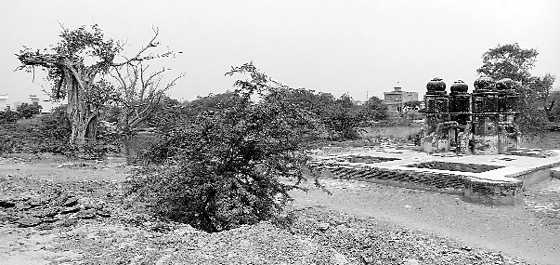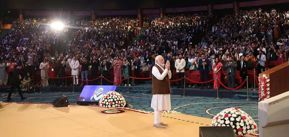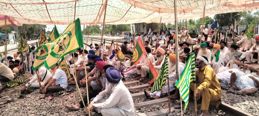
The well at Rohnat village in Bhiwani district in which several women along with their children jumped into to save themselves from British forces.
Ranbir Singh
On May 29, 1857, the spark of the Sepoy Mutiny started spreading across Bundelkhand, Awadh or Oudh, Behar, northwestern provinces and modern Haryana. The rebellion first started at Ambala and then spread to Hisar and Rohtak divisions of erstwhile joint Punjab.
But the repercussions were ghastly and marks it left on both Indians and British are indelible even to this day.
Neonda Jat and Bairagi Birad Dass from Rohnat village (now in Bhiwani district) joined other rebels from the adjoining villages, which were inhabited mainly by Ranghars or Pawar Rajputs turned Muslims long ago. Provoked by the events that first took place in Hisar town, the rebel sepoys broke the jail and released convicts and inmates. Persecution and killing of the British and their family members followed at Hisar and Hansi and elsewhere.
The British were so furious that with full preparations and ammunition they invaded villages, and did not spare anyone, not even women and children. Fearing for life, many villagers jumped into a nearby deep masonry well and were drowned. Zamalpur village was burnt twice. Many among the captured were hanged on a banyan tree that still bears testimony to the gory tale. A few were brought to Hansi and crushed under a huge stoneroller. The vengeance didn’t stop there: the Tehsildar and the Patwari were asked to submit the records of all village estates and Rohnat village was especially marked for confiscation of entire agricultural land. A few months later, about 1,500 hectares were sold in an open auction in which the residents of the villages situated a few miles west of Hansi had bid and paid for.
The descendants of the 1857 rebels became active in regaining their lost estates after the formation of Haryana. They had submitted representations to the higher political leadership and the administration and the media had also highlighted the issue. Those who had returned to Rohnat after decades of land confiscation were allowed to reside as agricultural labourers on the land previously owned by their ancestors.
In all these years since Independence, the descendants of the participants of the 1857 rebellion or freedom fighters continued to fight for claims without much result, except some nominal financial aid. It was once considered that plots equivalent to the lost one, besides a one-time compensation of Rs 64.32 lakh could be paid to the claimants but nothing was paid and not an inch of land was allotted.
This clearly reflects a lackadaisical attitude of the Haryana Government.
The matter has been under consideration for over 70 years and it seems that the state government is dilly-dallying on payment of adequate compensation to the descendants whose fate is no less than that of castaways. Hisar Bir or government wasteland north of Hisar town had been considered for alternate compensation for the lost land at Rohnat. A panchayat resolution accepted the government proposal but no allotment of agricultural plots could have been done without a green light from the state Cabinet.
Meanwhile, villagers are condemned to live with the gory memories of 1857, many of whom have become mental wreck. The bureaucracy did its part but the political leadership was indecisive, as a result the fate of about 100 families hung in balance. It could probably be due to the fact that the government doesn’t want to part with valuable land that it may need for expansion of institutional areas. Rohnat residents, who were punished or executed, were accorded the status of ‘martyrs’ or ‘freedom fighters’ by people, but not by the government. The government could be in a dilemma but compensation could have served as a healing touch.
(The writer is former PRO, ICMR, Department of Health Research, New Delhi)



























